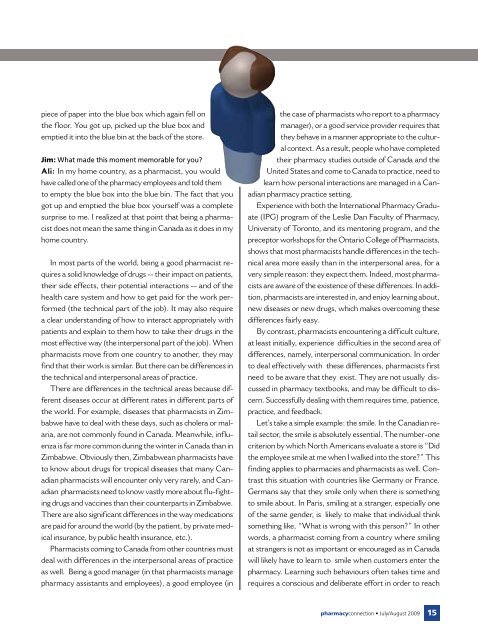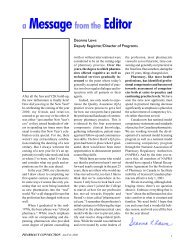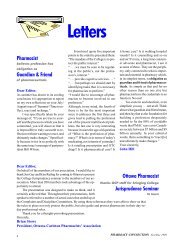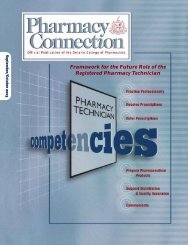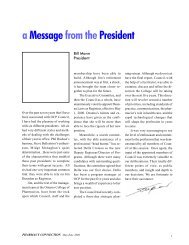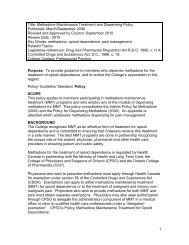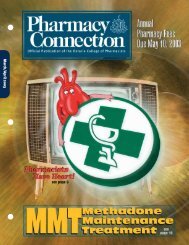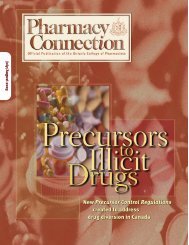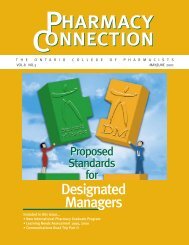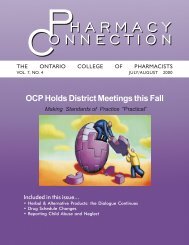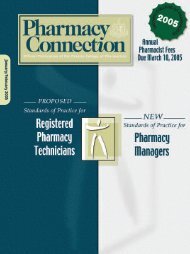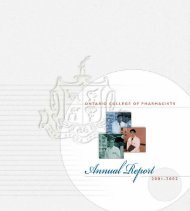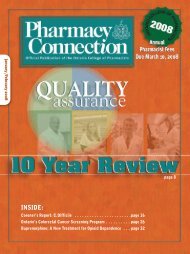Understand the Culture in Which You Practise Hyperthermia: Are ...
Understand the Culture in Which You Practise Hyperthermia: Are ...
Understand the Culture in Which You Practise Hyperthermia: Are ...
You also want an ePaper? Increase the reach of your titles
YUMPU automatically turns print PDFs into web optimized ePapers that Google loves.
piece of paper <strong>in</strong>to <strong>the</strong> blue box which aga<strong>in</strong> fell on<br />
<strong>the</strong> floor. <strong>You</strong> got up, picked up <strong>the</strong> blue box and<br />
emptied it <strong>in</strong>to <strong>the</strong> blue b<strong>in</strong> at <strong>the</strong> back of <strong>the</strong> store.<br />
Jim: What made this moment memorable for you?<br />
Ali: In my home country, as a pharmacist, you would<br />
have called one of <strong>the</strong> pharmacy employees and told <strong>the</strong>m<br />
to empty <strong>the</strong> blue box <strong>in</strong>to <strong>the</strong> blue b<strong>in</strong>. The fact that you<br />
got up and emptied <strong>the</strong> blue box yourself was a complete<br />
surprise to me. I realized at that po<strong>in</strong>t that be<strong>in</strong>g a pharmacist<br />
does not mean <strong>the</strong> same th<strong>in</strong>g <strong>in</strong> Canada as it does <strong>in</strong> my<br />
home country.<br />
In most parts of <strong>the</strong> world, be<strong>in</strong>g a good pharmacist requires<br />
a solid knowledge of drugs -- <strong>the</strong>ir impact on patients,<br />
<strong>the</strong>ir side effects, <strong>the</strong>ir potential <strong>in</strong>teractions -- and of <strong>the</strong><br />
health care system and how to get paid for <strong>the</strong> work performed<br />
(<strong>the</strong> technical part of <strong>the</strong> job). It may also require<br />
a clear understand<strong>in</strong>g of how to <strong>in</strong>teract appropriately with<br />
patients and expla<strong>in</strong> to <strong>the</strong>m how to take <strong>the</strong>ir drugs <strong>in</strong> <strong>the</strong><br />
most effective way (<strong>the</strong> <strong>in</strong>terpersonal part of <strong>the</strong> job). When<br />
pharmacists move from one country to ano<strong>the</strong>r, <strong>the</strong>y may<br />
f<strong>in</strong>d that <strong>the</strong>ir work is similar. But <strong>the</strong>re can be differences <strong>in</strong><br />
<strong>the</strong> technical and <strong>in</strong>terpersonal areas of practice.<br />
There are differences <strong>in</strong> <strong>the</strong> technical areas because different<br />
diseases occur at different rates <strong>in</strong> different parts of<br />
<strong>the</strong> world. For example, diseases that pharmacists <strong>in</strong> Zimbabwe<br />
have to deal with <strong>the</strong>se days, such as cholera or malaria,<br />
are not commonly found <strong>in</strong> Canada. Meanwhile, <strong>in</strong>fluenza<br />
is far more common dur<strong>in</strong>g <strong>the</strong> w<strong>in</strong>ter <strong>in</strong> Canada than <strong>in</strong><br />
Zimbabwe. Obviously <strong>the</strong>n, Zimbabwean pharmacists have<br />
to know about drugs for tropical diseases that many Canadian<br />
pharmacists will encounter only very rarely, and Canadian<br />
pharmacists need to know vastly more about flu-fight<strong>in</strong>g<br />
drugs and vacc<strong>in</strong>es than <strong>the</strong>ir counterparts <strong>in</strong> Zimbabwe.<br />
There are also significant differences <strong>in</strong> <strong>the</strong> way medications<br />
are paid for around <strong>the</strong> world (by <strong>the</strong> patient, by private medical<br />
<strong>in</strong>surance, by public health <strong>in</strong>surance, etc.).<br />
Pharmacists com<strong>in</strong>g to Canada from o<strong>the</strong>r countries must<br />
deal with differences <strong>in</strong> <strong>the</strong> <strong>in</strong>terpersonal areas of practice<br />
as well. Be<strong>in</strong>g a good manager (<strong>in</strong> that pharmacists manage<br />
pharmacy assistants and employees), a good employee (<strong>in</strong><br />
<strong>the</strong> case of pharmacists who report to a pharmacy<br />
manager), or a good service provider requires that<br />
<strong>the</strong>y behave <strong>in</strong> a manner appropriate to <strong>the</strong> cultural<br />
context. As a result, people who have completed<br />
<strong>the</strong>ir pharmacy studies outside of Canada and <strong>the</strong><br />
United States and come to Canada to practice, need to<br />
learn how personal <strong>in</strong>teractions are managed <strong>in</strong> a Canadian<br />
pharmacy practice sett<strong>in</strong>g.<br />
Experience with both <strong>the</strong> International Pharmacy Graduate<br />
(IPG) program of <strong>the</strong> Leslie Dan Faculty of Pharmacy,<br />
University of Toronto, and its mentor<strong>in</strong>g program, and <strong>the</strong><br />
preceptor workshops for <strong>the</strong> Ontario College of Pharmacists,<br />
shows that most pharmacists handle differences <strong>in</strong> <strong>the</strong> technical<br />
area more easily than <strong>in</strong> <strong>the</strong> <strong>in</strong>terpersonal area, for a<br />
very simple reason: <strong>the</strong>y expect <strong>the</strong>m. Indeed, most pharmacists<br />
are aware of <strong>the</strong> existence of <strong>the</strong>se differences. In addition,<br />
pharmacists are <strong>in</strong>terested <strong>in</strong>, and enjoy learn<strong>in</strong>g about,<br />
new diseases or new drugs, which makes overcom<strong>in</strong>g <strong>the</strong>se<br />
differences fairly easy.<br />
By contrast, pharmacists encounter<strong>in</strong>g a difficult culture,<br />
at least <strong>in</strong>itially, experience difficulties <strong>in</strong> <strong>the</strong> second area of<br />
differences, namely, <strong>in</strong>terpersonal communication. In order<br />
to deal effectively with <strong>the</strong>se differences, pharmacists first<br />
need to be aware that <strong>the</strong>y exist. They are not usually discussed<br />
<strong>in</strong> pharmacy textbooks, and may be difficult to discern.<br />
Successfully deal<strong>in</strong>g with <strong>the</strong>m requires time, patience,<br />
practice, and feedback.<br />
Let’s take a simple example: <strong>the</strong> smile. In <strong>the</strong> Canadian retail<br />
sector, <strong>the</strong> smile is absolutely essential. The number-one<br />
criterion by which North Americans evaluate a store is “Did<br />
<strong>the</strong> employee smile at me when I walked <strong>in</strong>to <strong>the</strong> store?” This<br />
f<strong>in</strong>d<strong>in</strong>g applies to pharmacies and pharmacists as well. Contrast<br />
this situation with countries like Germany or France.<br />
Germans say that <strong>the</strong>y smile only when <strong>the</strong>re is someth<strong>in</strong>g<br />
to smile about. In Paris, smil<strong>in</strong>g at a stranger, especially one<br />
of <strong>the</strong> same gender, is likely to make that <strong>in</strong>dividual th<strong>in</strong>k<br />
someth<strong>in</strong>g like, “What is wrong with this person?” In o<strong>the</strong>r<br />
words, a pharmacist com<strong>in</strong>g from a country where smil<strong>in</strong>g<br />
at strangers is not as important or encouraged as <strong>in</strong> Canada<br />
will likely have to learn to smile when customers enter <strong>the</strong><br />
pharmacy. Learn<strong>in</strong>g such behaviours often takes time and<br />
requires a conscious and deliberate effort <strong>in</strong> order to reach<br />
pharmacyconnection • July/August 2009<br />
15


